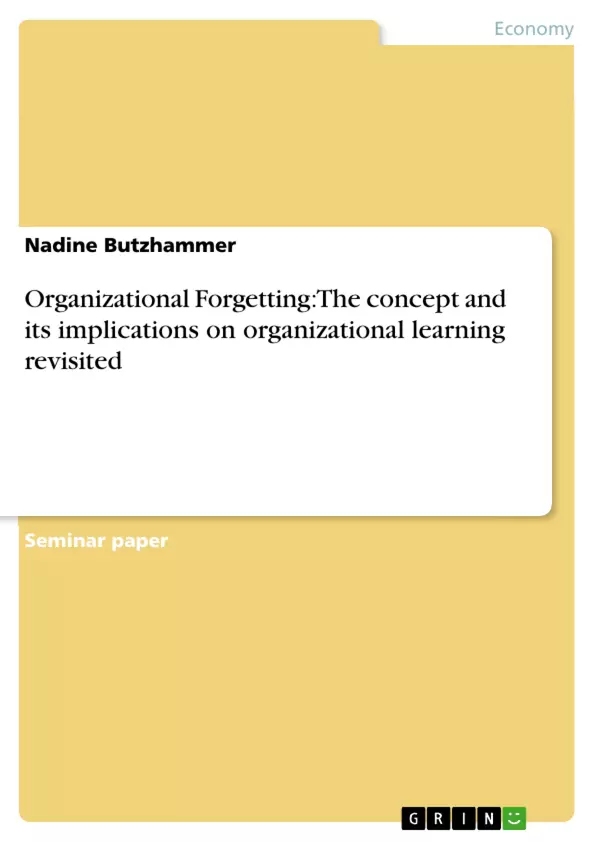Learning and forgetting – what at the first glance seems contradictory, turns out to interrelate. The authorship argues that forgetting constitutes the prerequisite for learning as it releases capacities to be able to deal with new stimuli. Out of this, a positive impact of forgetting on learning is apparent. But is this really the only effect? It is time to scrutinize forgetting and its implications more carefully.
In the intricate relationship between learning and forgetting, there is a surprising synergy at play. Forgetting, often seen as the antagonist of learning, actually serves as a catalyst for it. It is a process that liberates cognitive capacities, making room for the absorption of new knowledge.
This dynamic relationship is highlighted by Blaschke and Schoeneborn (2006), who argue that a higher organizational forgetting rate results in increased knowledge levels. To illustrate this, consider a bakery that has been forming pretzels using the same method for years. When the bakery owner introduces a more efficient technique, it's essential to eliminate the old knowledge. The deeply ingrained routine becomes a barrier to learning the new method. Only by allowing the old knowledge to fade into the background can the staff adapt to the better approach. Failure to forget hinders the organization's progress.
Inhaltsverzeichnis (Table of Contents)
- Learning and forgetting
- The bakery example
- Forgetting in the sense of no amnesia
- The notion of „blinding out“
- Impact on learning
- Constructivism and the subjective image of reality
- Examples of forgetting restricting learning content
- Organizations and individuals as autopoietic systems
- The source of knowledge in autopoietic systems
- Prevention methods to diminish the influence on future learning content
- Summary and propositions
- Conclusion
Zielsetzung und Themenschwerpunkte (Objectives and Key Themes)
This paper aims to revisit the concept of organizational forgetting and its implications on organizational learning. It argues that forgetting is a crucial element in the learning process, but that it also restricts the potential learning content of organizations.
- The nature of organizational forgetting and its distinction from amnesia
- The role of forgetting in enabling organizational learning
- The limitations of forgetting on the scope of organizational learning
- The influence of constructivism on individual and organizational learning
- Strategies to mitigate the limitations of forgetting on organizational learning
Zusammenfassung der Kapitel (Chapter Summaries)
- The essay begins by introducing the concept of organizational forgetting and its link to learning. It argues that forgetting can be beneficial for learning as it allows organizations to release capacities for new stimuli.
- The author illustrates the concept of forgetting with the example of a bakery, where employees need to forget an old method of forming pretzels in order to learn a new, more efficient one.
- The essay further explores the concept of forgetting, highlighting that it does not involve complete amnesia, but rather a process of moving irrelevant knowledge to a lower level of consciousness.
- The author introduces the term "blinding out" as a more accurate description of the process of forgetting and its impact on learning. He explains that while forgetting is necessary for learning, it also restricts the potential learning content by influencing the individual's perception of reality.
- The essay examines the concept of constructivism and how it relates to forgetting and learning. It argues that individuals construct their own reality based on past experiences, even those that have been "blinded out," which ultimately restricts the scope of possible learning content.
- The author provides examples of how forgotten knowledge can restrict learning content, including complacent background conversations and framing. These examples illustrate how unconscious influences can shape an individual's perception and limit their ability to learn new information.
- The essay delves into the concept of organizations as autopoietic systems, which are self-creating and independent of external influences. It explores how this inherent property of organizations can lead to a reliance on past knowledge, even if it has been deemed irrelevant, and limit their ability to learn new things.
- The author discusses the source of knowledge in autopoietic systems, arguing that while it may appear "new," it still stems from the organization's constructed reality and therefore remains limited. This suggests that organizations are dependent on external triggers for genuinely novel learning experiences.
- The essay concludes by presenting three key propositions regarding organizational forgetting and its impact on learning. It emphasizes the importance of understanding the process of forgetting and its potential limitations to maximize the effectiveness of organizational learning, especially in terms of acquiring new knowledge.
Schlüsselwörter (Keywords)
The main keywords and focus topics of the text include organizational forgetting, organizational learning, constructivism, autopoietic systems, amnesia, blinding out, learning content, knowledge acquisition, and external triggers. The paper explores the complex relationship between these concepts and its implications for organizational development and knowledge management.
Frequently Asked Questions
What is organizational forgetting?
It is the process by which an organization intentionally or unintentionally lets go of old knowledge or routines to make room for new learning and stimuli.
How does forgetting relate to learning?
Forgetting is a prerequisite for learning; by "blinding out" old, inefficient methods, an organization releases cognitive capacity to adapt to better techniques.
What is the "bakery example" in this context?
A bakery staff must "forget" an old way of forming pretzels to successfully adopt a new, more efficient method; otherwise, the old routine acts as a barrier.
What are autopoietic systems?
Organizations as autopoietic systems are self-creating and often rely on their own constructed reality, which can limit their ability to perceive genuinely new information from the outside.
Does organizational forgetting mean total amnesia?
No, it is not amnesia; it is rather a process of moving irrelevant knowledge to a lower level of consciousness or "blinding it out" for current operations.
- Citar trabajo
- Nadine Butzhammer (Autor), 2018, Organizational Forgetting: The concept and its implications on organizational learning revisited, Múnich, GRIN Verlag, https://www.grin.com/document/538600



